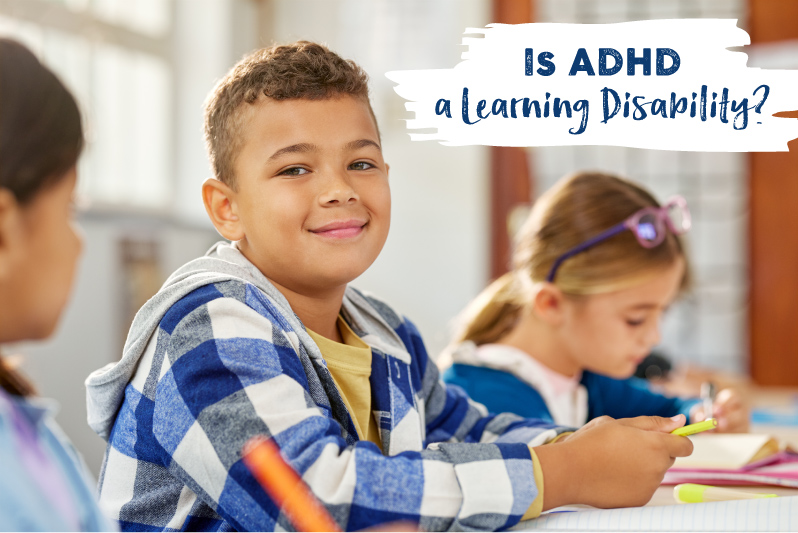
Is ADHD a Learning Disability?
No, ADHD is not classified as a learning disability, but it may make learning more challenging.
Though ADHD is not categorized as a learning disability, research shows that 30-50% of children with ADHD also have a specific learning disability, making learning even more challenging. The interaction between these conditions can further complicate academic achievement.
ADHD Definition:
ADHD is a neurodevelopmental disorder that affects the brain’s prefrontal cortex, the area responsible for managing thoughts and behaviors.
Learning Impact of ADHD:
While ADHD doesn’t directly affect academic skills like reading, writing, or math, it can impact executive function. This means difficulties with planning, organization, and maintaining focus, which are critical for learning.
Further, under the Individuals with Disabilities Education Act (IDEA), ADHD can be considered a disability, potentially making students eligible for special education services and/or accommodations.
Supporting Students with ADHD: The Impact of Targeted Instruction
Many students with ADHD face unique challenges when it comes to learning. While ADHD is not classified as a learning disability, its effects on executive functioning—such as difficulties with focus, planning, and organization—can make academic achievement more difficult. This is particularly true for students who also struggle with decoding and language comprehension.
At Lindamood-Bell, we’ve seen firsthand how targeted instruction can make a significant difference for students with these dual challenges. For example, students with a prior ADHD diagnosis who experienced both decoding and language comprehension difficulties were provided with Seeing Stars® and Visualizing and Verbalizing® instruction. The results were remarkable: these students achieved substantial improvements in both decoding and comprehension. In fact, they made large (statistically significant) standard score gains on eight of nine measures.
One particularly encouraging outcome was a 27-point increase in percentile rank for Word Recognition and a 20-point increase in Written Language Comprehension, placing these students well within the normal range (25th-75th percentile). This demonstrates how the right instructional approach can help students with ADHD not only overcome their learning obstacles but thrive academically.
While ADHD itself may not affect specific academic skills, the way it interacts with other learning difficulties—like those involving decoding and comprehension—requires a comprehensive approach. With the right support, including specialized instruction and effective strategies, students with ADHD can achieve meaningful and lasting progress in their academic journeys.

Students with a prior ADHD diagnosis who had both decoding and language comprehension difficulties received both Seeing Stars and Visualizing and Verbalizing instruction. These students achieved significant improvements in decoding and comprehension. They made large (statistically significant) standard score changes on eight of nine measures.
Years: Jan. 2008 – Dec. 2023
Number of Students: 2,136
Average Age: 11.9
Average Hours of Instruction: 155.4
Lindamood-Bell Instruction Implemented: Seeing Stars and Visualizing and Verbalizing
Lindamood-Bell: Supporting Students with ADHD and Learning Challenges

At Lindamood-Bell, we specialize in helping students overcome challenges related to ADHD and other learning difficulties. Our evidence-based programs, such as Seeing Stars for decoding and Visualizing and Verbalizing for comprehension, have been proven to significantly improve academic performance. We believe that every student, regardless of their diagnosis, can learn to their full potential with the right kind of instruction.
With nearly 40 years of experience, we’ve helped students of all ages make remarkable progress in reading, comprehension, and overall learning. Whether a student is struggling with focus, planning, or understanding complex material, our sensory-cognitive instruction is designed to target and strengthen the specific learning and literacy skills that provide the foundation for success.
If your child faces challenges related to ADHD or other learning difficulties, Lindamood-Bell offers individualized instruction to support their success. Our programs are available both in-person and online, providing families with flexibility without compromising quality. The first step is a comprehensive Learning Ability Evaluation, which identifies your child’s strengths and areas of need. Based on the results, we recommend either 1-to-1 instruction or enrollment in Lindamood-Bell Academy. This personalized approach targets the root causes of learning difficulties, helping your child thrive. Schedule a Learning Ability Evaluation today to start their journey to success.
Discover more on our website or contact us today to learn how we can help your child thrive academically. Call 800-233-1819 to get started!






